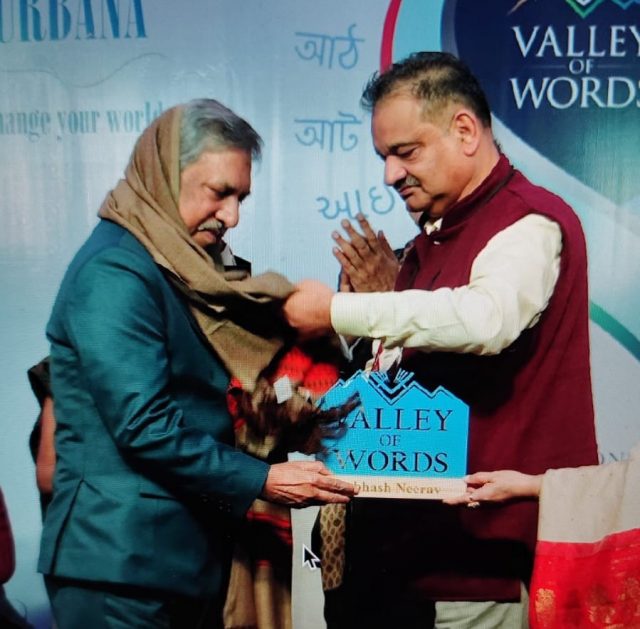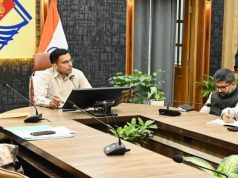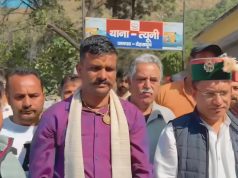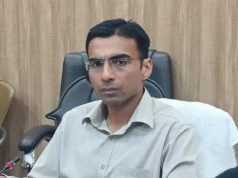By Dr Tania Saili Bakshi & Nikita Aggarwal
Dehradun, 14 Sep: The Valley of Words (VoW) Literature and Arts Festival 2025, to be held at Hotel Madhuban, Dehradun, on 25 & 26 October, will once again bring together writers, thinkers, scientists, and artists from across the country and beyond.
Among its most significant verticals is the RS Tolia Forum (RSTF), curated by Dr Rajendra Dobhal, Vice Chancellor of Swami Rama Himalayan University, which has consistently addressed pressing challenges faced by Himalayan communities.
As Valley of Words (VoW) continues to bridge literature with pressing global issues, this year’s focus turns to the fragile urban landscapes of the Himalayas. In this candid Q&A, Dr Rajendra Dobhal, Vice Chancellor of Swami Rama Himalayan University, shares his perspective on how VoW has evolved, the future of mountain cities, and how the focus on “Glaciers Are Melting, Is Anyone Listening?” is pertinent and urgent in today’s scenario…
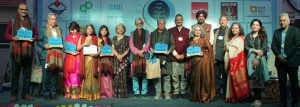
You have been associated with Valley of Words (VoW) for a long time. How have you seen the literature festival evolve over the years?
Valley of Words has been very successful in rejuvenating the legacy of the Doon Valley in the areas of literature, art, and culture. What excites me most is its ability to bring together intellectuals across diverse disciplines, creating an open space for dialogue. It is fascinating, eventful, and a joy to be part off. Personally, I find it to be a platform where one can “learn and learn more” while contributing meaningfully to the festival’s larger objective of celebrating knowledge.
As the Curator of the RSTF (Dr RS Tolia Forum) vertical, what trends have you observed? What has worked well, and what could be improved?
The RSTF vertical has consistently served as a forum for disseminating knowledge, especially to younger audiences who are curious about complex issues. What works best is its ability to invite queries, even those that are sometimes difficult to answer and to create meaningful conversations about mountains, migration, and sustainability.
However, the scope must be widened. The Indian Himalayan Region is undergoing tremendous changes, and we need deeper deliberations on challenges such as trans-migration, biodiversity loss, agriculture under climate stress, housing fragility, and water conservation. Dr RS Tolia always envisioned the Forum as a platform beyond Uttarakhand, and we should organise such events in other Himalayan states too. Of course, financial constraints remain a challenge, but institutional mechanisms and partnerships must be explored to make this dream sustainable.
How does the vertical on Science and Technology integrate with a literary festival?
There is no society without science, and there is no future without technology. The legacy of literature and science is not contradictory; they are complementary streams of knowledge. Scientific institutions, universities, and global collaborations have historically shaped human progress. By bringing science to a literary space, we are making these discussions accessible, engaging, and reflective.
If we take the example of climate change, we discussed resilience at VoW even before events like the Dharali disaster occurred. That tragedy, rooted in heavy rainfall, glacial melt, and probable cloudbursts, shows why such conversations matter. Similarly, erratic dry spells are devastating agriculture in the hills. Science and literature together allow us to not only study these issues but also narrate them in a way that mobilises communities.
At the upcoming edition, we will address the fate of glaciers, the “Third Pole” that sustains millions across South Asia. Protecting them is our responsibility, and awareness is the first step.
The upcoming RSTF session on “Mountain Cities of the Future” sounds timely. What will it focus on?
We are at a critical juncture. Migration from villages to towns has been constant, but these mountain towns are now bursting at the seams. Their carrying capacities have been exceeded. Joshimath is a stark reminder of what unplanned expansion can do: a settlement that grew into a township without adequate scientific planning is now in crisis.
And Joshimath is not an isolated case; many other towns are quietly heading toward similar disasters. The session will deliberate on how to build resilient mountain cities for the future. Our goal is to place science-driven, sustainable urban planning at the heart of discourse before it is too late.
What about the second RSTF session? What themes will it cover?
The Forum will also focus on the critical theme titled “Glaciers Are Melting, Is Anyone Listening?”. The session will feature leading geoscientist Dr Harish Bahuguna and award-winning journalist Rahul Kotiyal, bringing scientific rigour and narrative depth to a subject that directly affects millions of lives. As Dr Dobhal poignantly remarks, “Glaciers are not just ice masses. They are heritage, lifelines, and warning signals. Their loss will change the story of the mountains and the plains alike.”
What is your advice to the younger generation about navigating the rapidly changing world of science and technology?
The younger generation will face even tougher challenges than us. Artificial Intelligence is no longer an abstract idea; it is already reshaping industries. But rather than fearing it, we must see it as a tool.
India’s trade deficit is a long-standing problem. The challenge before young Indians is to make the country trade surplus through innovation and entrepreneurship. We must become product-oriented rather than service-dependent. This requires investment in research, development, and above all, creative thinking.
To me, science and literature are not separate worlds. Both embody centuries of accumulated wisdom, both inspire imagination, and both shape the way we see ourselves. A literature festival, therefore, is the perfect place for the two to meet.
Finally, your message to Team Valley of Words.
Team VoW is a unique blend of experienced visionaries and energetic young volunteers. Their enthusiasm and commitment are what make this mega event run so smoothly. For me, VoW is not just a festival; it is a living classroom, a space for teaching and learning at its best. My message to the team is simple: continue this legacy, keep experimenting, and don’t hesitate to take leadership in setting global standards for knowledge festivals.

